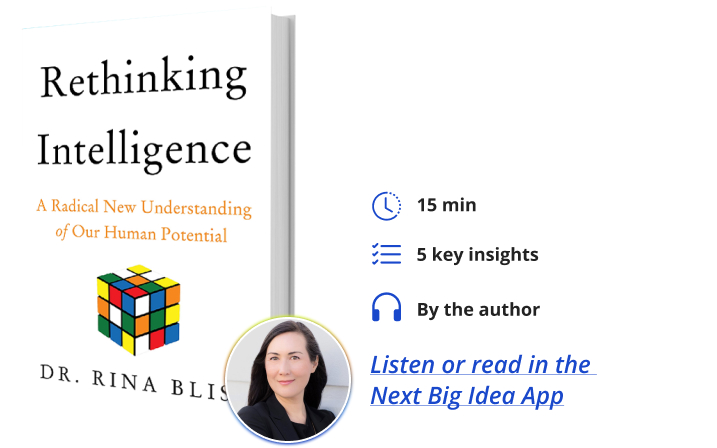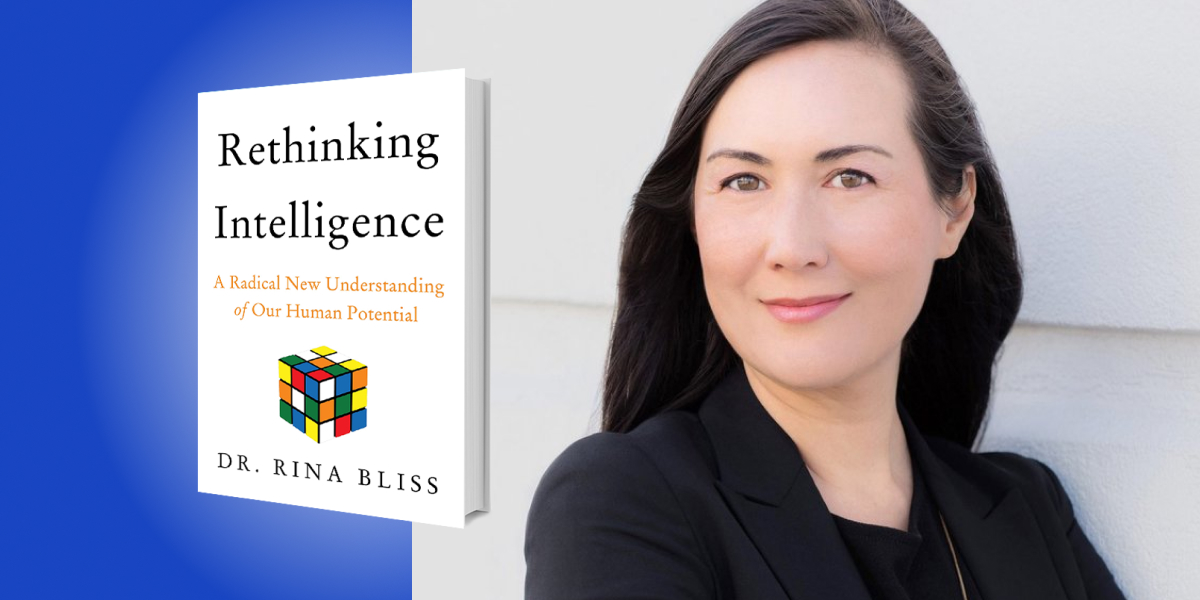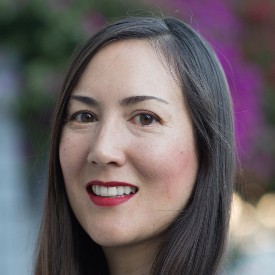Dr. Rina Bliss is a genetics expert, sociologist, and a mother of three young children. She researches the relationship between genes and environment and teaches sociology at Rutgers University.
Below, Rina shares 5 key insights from her new book, Rethinking Intelligence: A Radical New Understanding of Our Human Potential. Listen to the audio version—read by Rina herself—in the Next Big Idea App.

1. Test scores don’t tell us how smart we are.
I grew up in an immigrant community in Los Angeles. My mother is an immigrant who came to this country for opportunity—to make a better life for herself. She saw education as a way to succeed.
My success in school was measured by my grades and test scores. My mother placed importance on these scores. It was how the system was measuring me, and she saw them as a direct reflection of my intelligence and ability to ultimately succeed.
I took my first big test at the age of five. It was a test to get into a special magnet school, and I knew it was important. When the results came, I hadn’t made the cut. My scores weren’t high enough and my mother cried.
My second big test came a short time later for a gifted program within my school. I hadn’t changed. The same young Rina sat down to take a nearly identical test and this time I passed. Did I magically become someone different, someone smarter? No, because a test and its results can’t tell us how intelligent we are.
Society has this belief that intelligence is something you are born with—it’s genetic and unchanging. We’ve been sold this lie most of our lives. I know I was. We categorize people as “losers of a genetic lottery” if they don’t get a perfect SAT score or IQ test. But the truth is: intelligence isn’t genetic.
2. Intelligence is a process.
We’ve been taught to think of intelligence as fixed, stagnant, and unchanging. But research over the past two decades has shown that genes give us the brain structures that allow thinking to occur. They guide the process. Our genes, however, have nothing to do with the quality of those thoughts.
Intelligence is something we do, not something that is. I define intelligence as our ability to learn from our environments, and as being aware of opportunities to learn.
“Intelligence is something we do, not something that is.”
Our brains are always growing and developing. While the rate of that growth may change with age, the growth doesn’t stop. That means the opportunity to learn always exists. When we shift from thinking about intelligence as an object into a journey, we are better able to optimize that process. We can become more effective thinkers and learners.
Being intelligent is being aware that you can learn from the world around you… and that’s what human beings do best!
3. Our environments can empower or inhibit us.
Human beings have the same internal architecture. We grow brain cells, form connections between them (called neural networks), and our bodies do this naturally for our entire lives, whether neurotypical or neurodivergent. The thing limiting our intelligence isn’t biology, it’s our environment.
Stressful environments that lack basic resources hamper our ability to act on our potential—to think deeply and clearly. Stress is so toxic that it can modify our DNA and change how it functions. We then pass those toxic modifications on to our children and future generations.
“Stressful environments that lack basic resources hamper our ability to act on our potential.”
To allow everyone the opportunity to grow their intelligence, we must equalize our environments. We need to focus time, energy, and research on how to improve the conditions we live in—from air to water to safety and food. The stress of obtaining these things inhibits peoples’ ability to learn and changes the way their brains function. Improving our environments can empower our kids to think smarter.
4. We have infinite potential.
In my university classroom, I had a student who was labeled intellectually disabled from a young age. He had taken a test that marked him as having a low IQ. He was put into special education classes in high school, where he received a sub-par education and was told by his teacher that he would not make it to college. He would not be able to achieve the life he dreamed of.
But there was an adult who intervened. They encouraged him to try community college, ask for accommodations, and continue his education. That person inspired him to move beyond the limitations placed on him by an education system that views intelligence as a “have” or a “have not.” He went on to community college, excelled in his coursework, and made his way to my university classroom.
This student was one of the hardest working I’ve ever had. But he told me he had felt burdened by the label he received at previous schools, and it almost derailed him from working for the life he wanted—one that included higher education. He received this label, was encouraged to work against it, and walked into my classroom ready to grasp his own potential.
“What changed was how society viewed him and, in turn, judged him.”
By the time he got to university, he wasn’t a new person. What changed was how society viewed him and, in turn, judged him. They have decided he is “intelligent” even though his genetics—those things we tell ourselves define intelligence—are exactly the same.
What my student was able to do, with some help, was see the potential in himself. We are all infinitely able to learn…but we have to do something first.
5. Seize the learning moment.
We are infinitely able to learn and grow, but we must seize the learning moment. These can be big moments or very small. Every day, our brains are giving us the opportunity to create new networks and become smarter, but taking the opportunity to do so is up to us.
Seize the opportunity to learn from anyone. Parents and educators watch children do this constantly—and do so excitedly! Maybe we can’t do as much learning as they are, but we can choose singular moments to take that learning on with the same sense of excitement and wonder.
Now, I’m a realist. I know we can’t always choose to learn. There will be days that we face challenges that prohibit it, or we simply don’t have the energy to make that choice, and that’s okay. Take it one day at a time. Learn a little, rest a lot. Learn a little about your relationships, about yourself, and improve the course of your life in a small way. Then rest.
Every moment is an opportunity to change. You always have a chance to think about this thing, change that thing. But you also have the chance to take a break. When you don’t achieve, instead of calling yourself a failure, seize the opportunity to learn. Choose to see the potential in yourself and in others.
To listen to the audio version read by author Rina Bliss, download the Next Big Idea App today:
































